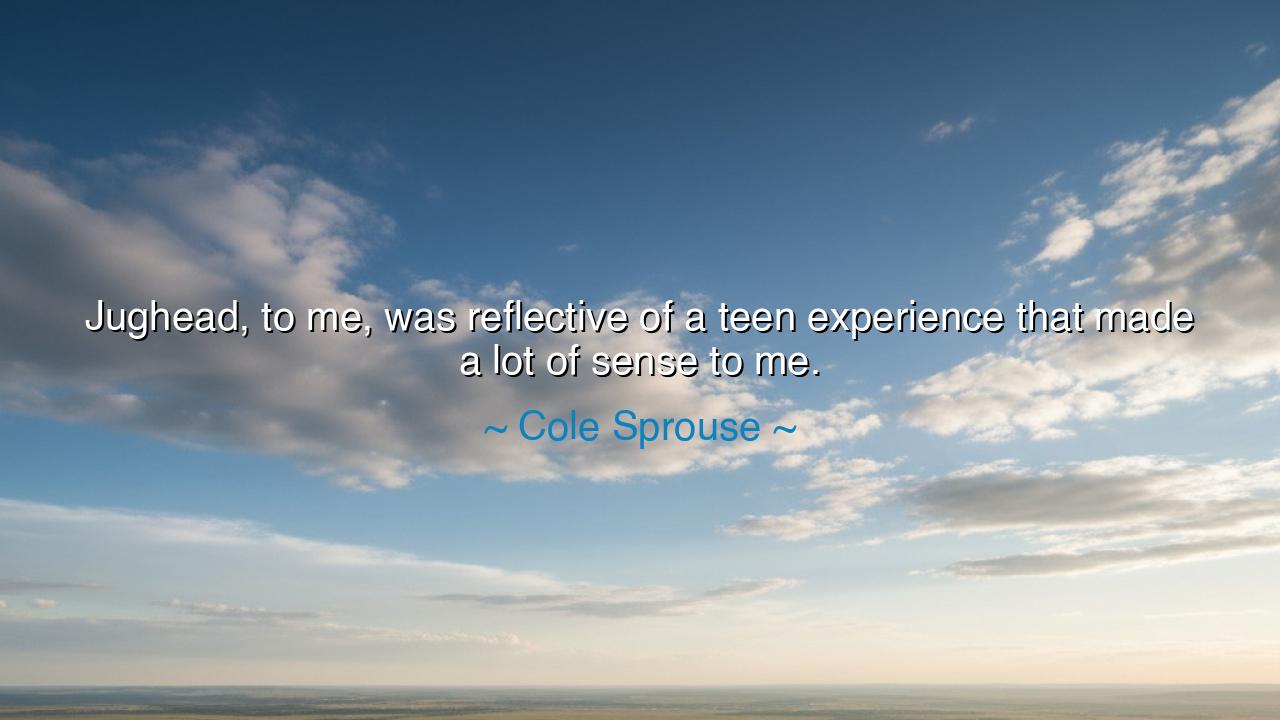
Jughead, to me, was reflective of a teen experience that made a






When Cole Sprouse declared, “Jughead, to me, was reflective of a teen experience that made a lot of sense to me,” he did not merely speak of a fictional character from the world of Riverdale or Archie Comics. He spoke of recognition, of the rare moment when art and reality meet, and a character becomes more than entertainment—becomes instead a mirror of the soul. In Jughead’s isolation, his sharp wit, his outsider’s stance, Sprouse saw the struggles and longings of adolescence itself, the essence of what it means to be young, restless, and searching.
The origin of his reflection lies in the timeless power of stories to embody the human condition. Jughead was never the golden hero or the shining star; he was the observer, the critic, the one who stood at the edges of the social hierarchy, speaking truths others were too afraid to voice. For Sprouse, this echoed the reality of many teenagers who do not find themselves at the center of attention but instead learn to navigate life with quiet resilience, insight, and sometimes loneliness. In claiming Jughead as reflective of his own teen experience, Sprouse affirmed that the outsider’s story is as valid and as human as the hero’s.
Throughout history, the voice of the outsider has often carried the deepest wisdom. Socrates wandered Athens, questioning rather than ruling, standing apart from power yet shaping the thought of generations. In literature, figures like Holden Caulfield in The Catcher in the Rye or Pip in Great Expectations have endured because they articulate the confusion, alienation, and yearning of youth. Jughead, too, stands in this tradition—the archetype of the youth who resists conformity and sees through the illusions of popularity, wealth, or shallow ambition.
Sprouse’s words remind us that adolescence is rarely a story of triumph alone. It is a season of contradictions, where one seeks belonging yet feels apart, where one longs for freedom yet is bound by circumstance. For many, like Jughead, the teen experience is defined not by being celebrated but by being misunderstood. Yet within this very estrangement lies the seed of perspective, the ability to see the world more clearly, to understand its injustices and absurdities in ways those who are “inside” cannot.
The deeper meaning of his reflection is that characters like Jughead give voice to the voiceless. They whisper to the teenager who feels invisible: you are not alone. They show that being different is not weakness, but a form of strength. They reveal that truth often comes from the margins, and that wisdom is sometimes born out of the very solitude that feels unbearable. In this way, Jughead is not just a character—he is a companion for all who feel like outsiders in their own youth.
The lesson here is clear: honor the outsider within yourself. If your path feels different, if you stand apart from the crowd, do not despise that experience. Instead, see it as a gift, a source of clarity and resilience that will shape your life. The desire to belong is strong, but the ability to endure without belonging can be stronger still. Jughead’s example, as Sprouse saw it, is a reminder that survival and self-awareness are victories no less important than popularity or power.
Practical wisdom flows from this. If you are young and feel out of place, let characters like Jughead remind you that your story matters, that your experience is valid. Seek out art, books, and companions that speak to your truth, and know that solitude is not the same as failure. If you are older, remember to listen for the voices at the margins, for often they are the ones carrying the deepest insight. And if you create stories, write not only about heroes, but about those who dwell in the shadows—for in them, countless readers and viewers will find themselves reflected.
Thus, Cole Sprouse’s words must be passed on as a teaching: that the teen experience, with all its longing and contradiction, finds its voice not only in shining protagonists but in the quiet strength of the outsider. Jughead, reflective and misunderstood, stands as a symbol of resilience, a companion to all who seek meaning in their difference. And so the teaching is eternal: the outsider is never truly outside, for he stands within the heart of all who have felt unseen.






AAdministratorAdministrator
Welcome, honored guests. Please leave a comment, we will respond soon